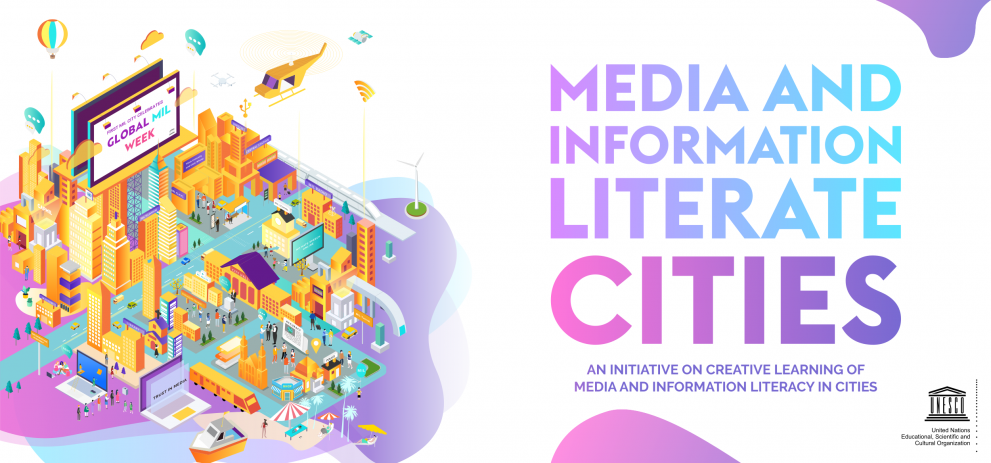Theme: “Nurturing Confidence: An imperative for media and information literacy.”
EDITION 2021
The 11th Global Media and Information Literacy Week will be celebrated from October 24-31, 2022 and will be hosted by Nigeria.
Global Media and Information Literacy Week 2022 will be hosted by Nigeria. In Our Common Agenda, a report by United Nations Secretary-General António Guterres, world leaders made twelve commitments. Among these commitments, Guterres stressed that the values of trust and solidarity are the glue of social cohesion and social achievements for the common good.
However, the harsh reality is that the trust factor is eroding. Considering the above context, the global community is called not only to reaffirm and increase its commitment to media and information literacy for all, but also to develop new initiatives on media and information literacy to nurture trust. Therefore, Global MIL Week 2022 focuses on trust and solidarity in relation to people, media, digital platforms, governments, the private sector, and nongovernmental organizations. The paper highlights some promising actions over the past year in relation to media and information literacy and how the latter helps to nurture trust and counteract distrust.
https://events.unesco.org/event?id=3326757343&lang=1033
UNESCO supports the development of media and information literacy for all to enable people to think critically and click wisely. The Organization is particularly committed to improving the capacities of policymakers, educators, information and media professionals, youth organizations and disadvantaged populations in this area by assisting member states in formulating national media and information literacy policies and strategies.
https://www.unesco.org/en/communication-information/media-information-literacy/about
https://en.unesco.org/MILCLICKS
https://www.facebook.com/MILCLICKS/
https://www.instagram.com/unescomilclicks/

Information literacy and media literacy are traditionally separate and distinct areas, but UNESCO’s strategy is to merge them into Media and Information Literacy-MIL, as a combined set of competencies (knowledge, skills, and behavior) needed in today’s world for life and work. The goal is to create societies in which people, through the possession of skills in information, communication and technology, participate more consciously in governance and sustainable development. MIL aims to empower citizens to think critically and interact in an informed and ethical manner with information and media content and services, at the same time it proposes creative and purposeful use of technology by users and strengthens knowledge of digital rights and ethical issues concerning access to and use of information. In this way, MIL contributes to strengthening intercultural dialogue, freedom of expression and peace in an increasingly digital society.
UNESCO’s mission to create media- and information-literate societies is realized through a comprehensive MIL strategy that includes the provision of models for teachers, international cooperation, the development of guidelines for enacting national policies, the articulation of a framework for indicators, and also the establishment of a university network and clearing house.
The development of MIL also aims to offer a systemic and long-term response to misinformation, as it appeals to national education policies by proposing innovative use of technology for both formal and informal education strategies with the goal of advancing lifelong learning for all.
MIL contributes to Sustainable Development Goal 16.10 (ensure public access to information and protect fundamental freedoms) and 11 (sustainable cities and communities) by increasing citizen awareness and building inclusive, resilient and sustainable communities. MIL also contributes to OSS 4 (quality education) by teaching digital skills and promoting critical thinking, and OSS 5.b (empowerment of women through ICT) by revitalizing people’s abilities to identify gender stereotypes and hate speech, including intersectional discrimination, in all types of media and on digital platforms, and to oppose them.
Essentially, MIL works to counter the impact of misinformation and misinformation as it provides citizens with critical thinking and informed interaction with all types of content, offline and online.
Recognizing these challenges and the potential of MIL to address them, stakeholders at all levels, such as governments, local authorities, media, youth rights groups, educators and teachers, researchers, media regulators, libraries, museums, and many others are intensifying their efforts and investments in MIL-related actions. In this context UNESCO is seen as a world leader in the advancement of MIL because the Organization has to its credit effective actions and programs that have produced concrete results in meeting the needs that actually exist. These initiatives include the creation of a network of universities on MIL and intercultural dialogue, online courses that everyone can access , materials for teachers , a global alliance for partnership on MIL .
Each year, UNESCO and the Global Alliance for Partnerships on Media and Information Literacy (GAPMIL) organize Global Media and Information Literacy (MIL) Week, during which recurring events (such as the International MIL and Intercultural Dialogue Conference and Youth Agenda Forum) and events are held around the world to promote the dissemination of MIL at the interdisciplinary level.
https://www.unesco.org/en/communication-information/media-information-literacy/about
https://en.unesco.org/MILCLICKS